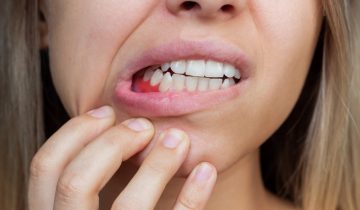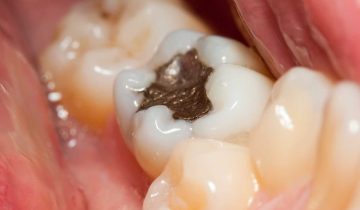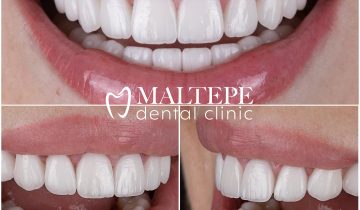Last updated on November 20th, 2023
Sore gum is a common problem that might cause pain, swelling, or bleeding in your mouth. Most people notice the problem while they are brushing or flossing their teeth. Sometimes the symptoms are not clear, and the problem gets bigger until it is detected.
In this post, you will read about sore gum in detail. The symptoms, causes, and treatments are all explained in the following sections of the article.
What Is Sore Gum?
Sore gum is a common discomfort in the gum tissue. It usually creates temporary problems but can be a symptom of serious gum diseases, as well. Therefore, addressing the problem earlier can save you from greater pain and treatment procedures.
What Are The Symptoms Of Sore Gum?
Sore gums might not have an obvious symptom. However, there are still some signs that you should take sore gums more seriously. Pain and swelling on the gum line are two common symptoms of sore gums. So, if you feel pain along with red gum, you can consider a sore gum problem. Also, swelling can be added to the aforementioned symptoms. In some cases, gum sensitivity and gum receding can accompany the other problems. Gum bleeding is another important symptom of sore gum problem that occurs during tooth brushing or flossing particularly.
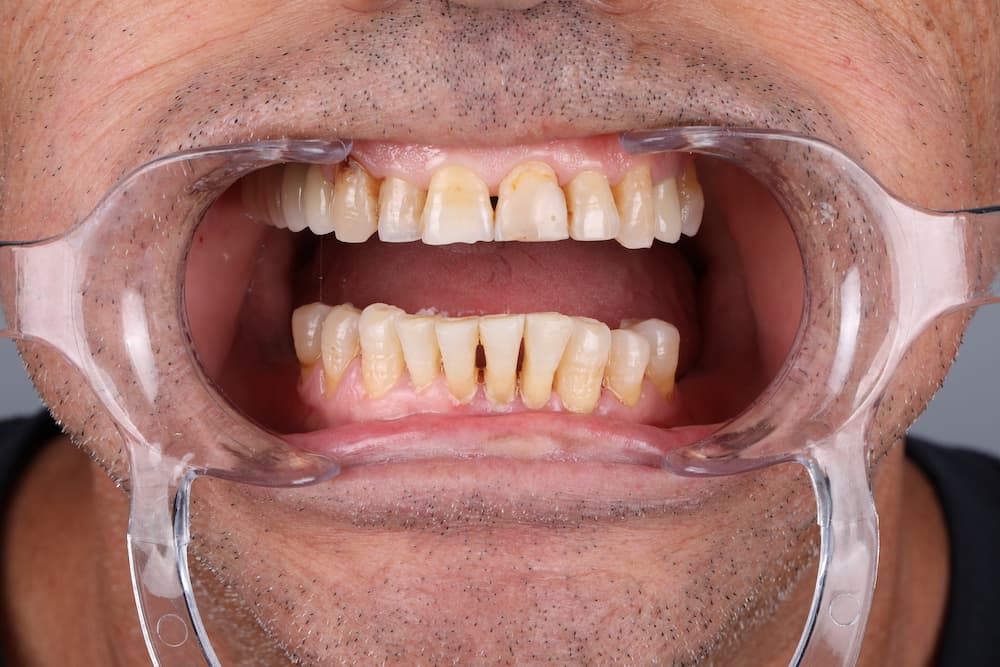
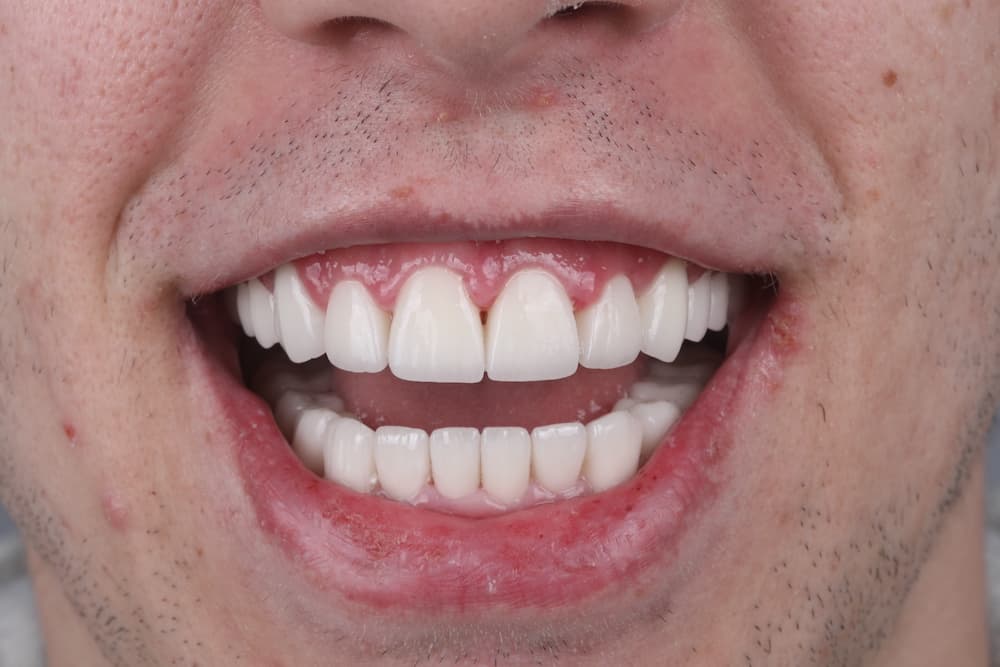
What Causes Sore Gum?
If you are asking “why is my gum sore?”, we can say that there is not just one reason. Various factors can lead to sore gum around one tooth or more. Here are some of the most common ones:
Gingivitis Or Periodontitis
Gingivitis is early-stage gum disease. Periodontitis, on the other hand, is more advanced gum disease. Both of them are among popular sore gum causes.
Oral Thrush
Thrush is the problem caused by the overgrowth of Candida, a fungus leading to problems in the mouth. White spots on the tongue and inner cheeks are typical features of this problem. Once the fungal infection settles on the gums, you might have irritated gums and soreness.
Diet
If your diet lacks vitamin C and calcium, it makes you more prone to gum problems. One of the most widespread ones is sore gum.
Tobacco
The risk of having gum disease is higher for smokers. Sore gum and bad breath are triggered by tobacco products.
Stress
It is not a secret that psychological factors affect our physiological conditions. When the stress level increases, the cortisol increases as well. Eventually, you might have sore and inflamed gums.
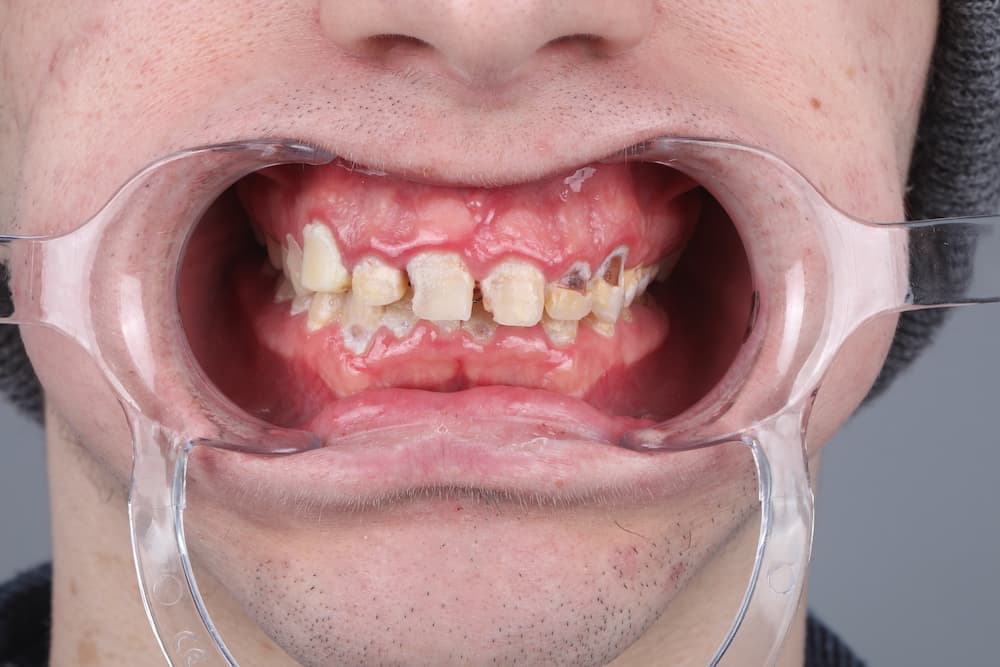
Poor Oral Hygiene
Oral hygiene is a simple and effective way to have healthy dental teeth and mouth. If you lack proper oral hygiene, the gums become more prone to sore gum problems.
Some Dental Treatments
When dental appliances such as dentures, retainers, mouthguards, or braces don’t fit properly, they might create frictions on the softer gum tissue. It might facilitate the bacteria invasion in the gum tissue. Eventually, your might have sore gum and inflammation.
Certain Issues Specific To Women
Hormonal changes, pregnancy, and menopause can affect your health.
Hormonal changes, mostly resulting from puberty or birth control pills, can make significant changes in the blood supply in the body, and it might affect the gum tissues, too. Sometimes, you might feel sore gum for a while.
Pregnancy is another factor in gum problems. As the progesterone level increases during the this period your body might have difficulty dealing with the bacteria and toxins. It leads to pregnancy gingivitis. The symptoms might include sore gums, gum bleeding, gum sensitivity… etc.
Menopause brings some changes in the body. As for your oral health, the most common issue is the lack of salvia in the mouth and the change in the taste. Resulting from the less salvia, you might feel more sensitive to cold and hot in her mouth. This sensitivity creates sore gums and even inflammation in more serious cases.
How To Treat Sore Gum?
Though sore gum can be very painful at times, fortunately, most of the problems can be treated just by taking care of oral hygiene better. However, if you are suffering from a prolonged sore gum problem, you should see your dentist rather than wait for your next meeting.
Here are a few simple home remedies for sore gum issues at home.
– Brush your teeth regularly
– Use a soft or extra soft-bristled toothbrush.
– Floss your teeth regularly
– Use oral washes special for gum care
– Avoid unhealthy diets and stressful lifestyles.
– Quit smoking
– Don’t skip your appointments with the dentist
When To See A Dentist?
If you notice red, swollen, or bleeding gums, watch the case for a week by taking care of your oral hygiene and diet. If the problem doesn’t go away, just visit your dentist and discuss the issue with him/her.
How To Cure Gum Disease Without A Dentist?
As mentioned above, oral hygiene is always important, but it is even more important when it comes to sore gum or other gum diseases. Therefore, flossing your teeth and brushing them with a soft-bristled toothbrush will help you eliminate the problem in most cases. You can also use exclusive gels and mouthwashes to soothe sore gums at home.
FAQs About Sore Gums
You can find answers to some of the most sought-after questions in this part about sore gum.
How Long Should Sore Gums Last?
Depending on the cause of the problem and how well you take care of your oral hygiene, it should take 10 days or so to heal completely. Also, you can see remarkable healing, if not a full recovery, within a few days.
What Is The Fastest Way To Heal Sored Gums?
You can take OTC painkillers, rinse your mouth with salt water, and keep brushing with a softer bristled toothbrush gently.
Does Salt Water Help Sore Gums?
Yes, it does. Since salt can remove the plaque and stain on the gum surface, rinsing your mouth with salt water helps you to make your mouth free from bacteria.
Can Sore Gum Heal On Its Own?
Yes, it is sometimes possible depending on the cause of the problem.
SOURCES
https://crest.com/en-us/oral-care-tips/gum-health/gum-disease-pictures-what-do-healthy-gums-look-like
https://www.healthline.com/health/sore-gums#TOC_TITLE_HDR_1
https://www.webmd.com/oral-health/treating-gum-pain



